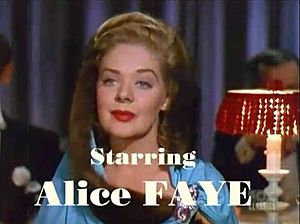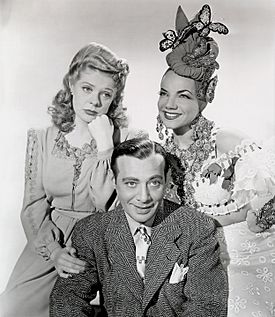Alice Faye facts for kids
Quick facts for kids
Alice Faye
|
|
|---|---|
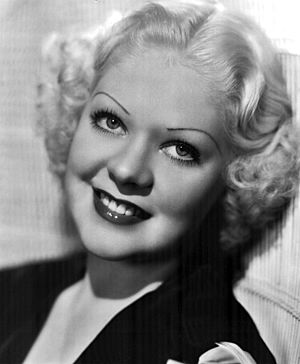
Faye in 1934
|
|
| Born |
Alice Jeanne Leppert
May 5, 1915 Manhattan, New York City, U.S.
|
| Died | May 9, 1998 (aged 83) |
| Resting place | Forest Lawn Cemetery |
| Occupation |
|
| Years active | 1934–1995 |
| Spouse(s) |
|
| Children | 2 |
Alice Faye (born Alice Jeanne Leppert; May 5, 1915 – May 9, 1998) was a famous American actress and singer. She was a big musical star for 20th Century Fox in the 1930s and 1940s. Alice Faye starred in popular movies like On the Avenue (1937) and Alexander's Ragtime Band (1938). Many people connect her with the Oscar-winning song "You'll Never Know." She first sang this song in the 1943 musical film Hello, Frisco, Hello.
After her film career, she became well-known for her role on the radio show The Phil Harris-Alice Faye Show.
Contents
Discovering Alice Faye's Life and Career
Early Life and Starting Out (1915–1933)
Alice Jeanne Leppert was born on May 5, 1915, in Hell's Kitchen, Manhattan, New York. Her mother, Alice Moffit, worked for a chocolate company. Her father, Charles Leppert, was a police officer. Alice also had an older brother named Charles.
Alice Faye started her entertainment career as a chorus girl in vaudeville shows. She tried out for a show called Earl Carroll Vanities but was too young. Then, she moved to Broadway and got a special part in the 1931 show George White's Scandals. Around this time, she started using her stage name, Alice Faye. She first sang for a radio audience on Rudy Vallée's show, The Fleischmann's Yeast Hour.
Becoming a Movie Star (1934–1938)
Alice Faye got her first big movie role in 1934. This happened when actress Lilian Harvey left the lead role in the film version of George White's Scandals (1934 film). Alice was first hired to sing a song with Rudy Vallée, but she ended up playing the main female character.
She quickly became a popular movie star in the 1930s. The head of Fox studios, Darryl F. Zanuck, took her under his wing. He helped her change her image from a sassy showgirl to a more wholesome, motherly type. She even appeared in a few films with child star Shirley Temple. Alice Faye also changed her look, going from platinum blonde hair to a more natural style.
Alice Faye played the main female role in In Old Chicago (1938). Zanuck wasn't sure about casting her at first, as the role was written for another actress. However, critics loved Alice Faye's performance. The movie had a 20-minute ending that showed the Great Chicago Fire. This scene was so dangerous that women, except for the main stars, were not allowed on set. In the film, she acted with two of her frequent co-stars, Tyrone Power and Don Ameche. Studios often paired their actors together in many movies.
Faye, Power, and Ameche worked together again in Alexander's Ragtime Band (1938). This movie featured more than 20 songs by Irving Berlin. Alice Faye once again received great reviews. It was one of the most expensive films of its time and became one of the most successful musicals of the 1930s.
Top of Her Game (1939–1940)
By 1939, Alice Faye was one of the top 10 actors who brought the most money to the box office in Hollywood. That year, she made Rose of Washington Square with Tyrone Power. This film was a big hit.
Because she was so popular, Fox sometimes put Alice Faye in movies just to make money, even if they didn't fully show her talents. Films like Tail Spin and Barricade (both 1939) were more dramatic and often didn't have any songs. But because she was so well-liked, none of her films in the 1930s and 1940s lost money. This success earned her the nickname "Queen of Fox."
One of Alice Faye's most memorable roles was playing the main character in the musical movie Lillian Russell (1940). Alice Faye always said this was one of her favorite films, but also her most challenging. She had to wear very tight corsets for the movie, which made her collapse on set several times.
Alice Faye turned down the lead role in Down Argentine Way (1940) because she was sick. The studio then gave the role to their new musical star, Betty Grable. Alice Faye and Betty Grable later played sisters in the film Tin Pan Alley (1940). During the making of this movie, a rumor started that they were rivals. However, Alice Faye later said in an interview that the Fox publicity team created the rumor, and that she and Betty Grable were actually good friends.
Later Work and Radio Success (1941–1995)
In 1941, Fox began making Alice Faye's musicals in Technicolor, which was a special feature for the studio in the 1940s. She often played a performer who was moving up in society. This allowed for many different kinds of stories, from sad to funny. Films like Week-End in Havana (1941) and That Night in Rio (1941) showed off her strong singing voice and good comedic timing. In That Night in Rio, she played a Brazilian aristocrat.
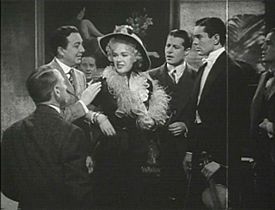
In 1943, after taking a year off to have her first daughter, Alice Faye starred in the Technicolor musical Hello, Frisco, Hello. This movie came out during World War II and became one of her highest-earning films for Fox. In this movie, Alice Faye sang "You'll Never Know." The song won an Academy Award for Best Original Song in 1943. Over a million copies of the song's sheet music were sold. Because of a rule in her contract, she couldn't officially record her movie songs. So, other singers like Dick Haymes, Frank Sinatra, and Rosemary Clooney became more known for the song. However, it is still often thought of as Alice Faye's signature song. That year, she was again named one of the top box-office stars in the world.
Stepping Away from Movies
As Alice Faye's popularity grew during the war, her family life became more important to her. This was especially true after her second daughter, Phyllis, was born. After Phyllis's birth, Alice Faye signed a new contract with Fox to make only one movie a year. This gave her more time to be with her family. Her second pregnancy led to a hospital stay, so she couldn't take a big dramatic role in A Tree Grows in Brooklyn. That part went to Joan Blondell. She also turned down a musical role in The Dolly Sisters, which went to June Haver.
Alice Faye finally accepted the main role in Fallen Angel (1945). Even though it was supposed to be her movie, Zanuck tried to promote his new actress, Linda Darnell. He ordered many of Alice Faye's scenes to be cut and Darnell's role to be made bigger. When Alice Faye saw the final movie, with 12 of her scenes and a song cut, she wrote a strong note to Zanuck. She then went straight to her car, gave her dressing room keys to the studio guard, and drove home. She promised never to return to Fox.
Alice Faye was still so popular that thousands of letters were sent to her home and the Fox studios from all over the world, asking her to make another movie. In 1987, she told an interviewer, "When I stopped making pictures, it didn't bother me because there were so many things I hadn't done. I had never learned to run a house. I didn't know how to cook. I didn't know how to shop. So all these things filled all those gaps."
After Fallen Angel, Alice Faye's contract said she had to make two more movies. Zanuck responded by making it hard for her to find work elsewhere, saying she broke her contract. This effectively ended her film career, but Alice Faye no longer wanted to be in movies. Fallen Angel was her last starring film. Zanuck, feeling pressure from the public, tried to get her to come back to the screen. Alice Faye returned all the scripts he sent.
Alice Faye did return to Fox later for a supporting role in a remake of an old Fox movie, State Fair (1962). She received good reviews, but the movie wasn't a big hit. After that, she only made a few small appearances in films. She played a secretary in Won Ton Ton, the Dog Who Saved Hollywood (1976) and a waitress in The Magic of Lassie (1978).
Alice Faye was featured on the British TV show This Is Your Life in 1984. She was surprised by the host, Eamonn Andrews, at a studio in Hollywood.
Marriage and Radio Career
Alice Faye's first marriage was to Tony Martin in 1937. It ended in divorce in 1940 because both had very busy careers, leaving little time together. In May 1941, she married bandleader Phil Harris. Their marriage was one of the most successful in Hollywood. Their life together even became a storyline on the popular radio comedy, The Jack Benny Program, where Phil Harris was a regular cast member for 16 years.
The couple had two daughters, Alice (born 1942) and Phyllis (born 1944). Phil Harris also had an adopted son from his first marriage, Phil Harris, Jr. (1935–2001). As Alice Faye's movie career slowed down, she and Phil Harris started working together in radio. First, they hosted a variety show on NBC called The Fitch Bandwagon in 1946. Their funny comedy sketches made them the stars of the show. By 1948, a new company sponsored the show, and it became a situation comedy with music from both Phil and Alice. It was renamed The Phil Harris-Alice Faye Show.
Phil Harris was already known for his comedic talent from his time on Jack Benny's radio shows. From 1936 to 1952, he played Benny's witty, cool bandleader. With their own show becoming a sitcom, bandleader-comedian Harris and singer-actress Faye played themselves. They raised two smart children in slightly silly situations. These often involved Harris's band guitarist Frank Remley (Elliott Lewis), the annoying delivery boy Julius Abruzzio (Walter Tetley), and the sponsor's representative Mr. Scott (Gale Gordon). Harris often got into funny trouble and needed Alice Faye to help him.
The Harrises' two daughters were played on radio by Jeanine Ann Roose and Anne Whitfield. The show was mostly written by Ray Singer and Dick Chevillat. The Phil Harris-Alice Faye Show stayed on NBC radio until 1954.
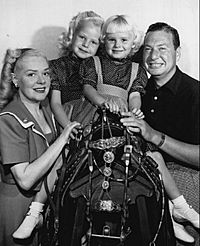
Alice Faye's singing of ballads and swing songs in her smooth contralto voice was a regular highlight of the show. She was also good at delivering sharp, witty lines, just like her husband. The show often joked about Alice's wealth from her movie career. Phil Harris would sometimes say, "I'm only trying to protect the wife of the money I love." Alice Faye would also sometimes make jokes about her disagreement with Zanuck, usually mentioning Fallen Angel.
In its early years, the Harris-Faye radio show was one of the top 10 radio programs in the country. The radio show also gave Alice Faye a perfect balance between her show business career and her home life. Since radio only required her to be there for a practice reading and the live broadcast, she could still spend most of her time at home with her daughters.
Later Years and Passing
Alice Faye and Phil Harris continued to work on different projects, both alone and together, for the rest of their lives. In 1974, Alice Faye returned to Broadway after 43 years. She starred in a new version of Good News with her old Fox co-star John Payne. In her later years, Alice Faye became a spokesperson for Pfizer Pharmaceuticals. She encouraged older people to live active lives. The marriage between Alice Faye and Phil Harris lasted for 54 years until Phil Harris passed away in 1995. Alice Faye once said in an interview that when she married Harris, most people in Hollywood thought their marriage would only last about six months.
Three years after Phil Harris's death, Alice Faye passed away from stomach cancer in Rancho Mirage, California. This was four days after her 83rd birthday. She was cremated, and her ashes are next to Phil Harris's at the mausoleum of the Forest Lawn Cemetery (Cathedral City) near Palm Springs, California. She has a star on the Hollywood Walk of Fame for her contributions to Motion Pictures at 6922 Hollywood Boulevard. In 1994, she also received a Golden Palm Star on the Palm Springs, California, Walk of Stars. The Phil Harris-Alice Faye Show is still a favorite for people who collect old radio shows.
Alice Faye's Popularity and Legacy
The New York Times wrote in her obituary that her voice was "inviting." Irving Berlin once said he would choose Alice Faye over any other singer to introduce his songs. George Gershwin and Cole Porter called her the "best female singer in Hollywood in 1937." During her years as a musical superstar (from the 1930s to the early 1940s), Alice Faye helped make 23 songs popular on the Hit Parade. She was the first female crooner and was as popular as Bing Crosby.
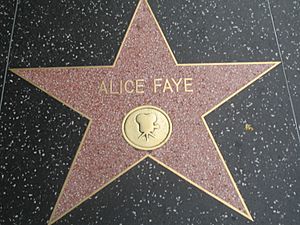
Alice Faye had fans all over the world, but she was especially popular in Great Britain. In The Alice Faye Movie Book, there's an article about her popularity there. The author, Arthur Nicholson, mentions how incredibly popular she was, even during her early career. While other films shown in England usually played for three days a week, Alice Faye's films played for an entire week. After Alice Faye retired in 1945, her old films that were re-released made as much money (and sometimes more) as new movies. When Alice Faye returned to the screen for State Fair in 1962, the film broke records in England.
Filmography
Film
| Year | Title | Role | Notes |
|---|---|---|---|
| 1934 | George White's Scandals | Kitty Donnelly / Mona Vale | Film debut |
| 1934 | Now I'll Tell | Peggy Warren | |
| 1934 | She Learned About Sailors | Jean Legoi | |
| 1934 | 365 Nights in Hollywood | Alice Perkins | |
| 1935 | George White's 1935 Scandals | Honey Walters | |
| 1935 | Every Night at Eight | Dixie Foley | |
| 1935 | Music Is Magic | Peggy Harper | |
| 1936 | King of Burlesque | Pat Doran | |
| 1936 | Poor Little Rich Girl | Jerry Dolan | |
| 1936 | Sing, Baby, Sing | Joan Warren | Nominated—Academy Award for Best Original Song |
| 1936 | Stowaway | Susan Parker | |
| 1937 | On the Avenue | Mona Merrick | |
| 1937 | You Can't Have Everything | Judith Poe Wells | |
| 1937 | Wake Up and Live | Alice Huntley | |
| 1937 | You're a Sweetheart | Betty Bradley | |
| 1938 | In Old Chicago | Belle Fawcett | |
| 1938 | Sally, Irene and Mary | Sally Day | |
| 1938 | Alexander's Ragtime Band | Stella Kirby | Nominated—Academy Award for Best Original Song |
| 1939 | Tail Spin | Trixie Lee | |
| 1939 | Rose of Washington Square | Rose Sargent | |
| 1939 | Hollywood Cavalcade | Molly Adair Hayden | |
| 1939 | Barricade | Emmy Jordan | |
| 1940 | Little Old New York | Pat O'Day | |
| 1940 | Lillian Russell | Lillian Russell | |
| 1940 | Tin Pan Alley | Katie Blane | |
| 1941 | That Night in Rio | Baroness Cecilia Duarte | |
| 1941 | The Great American Broadcast | Vicki Adams | |
| 1941 | Week-End in Havana | Nan Spencer | |
| 1943 | Hello, Frisco, Hello | Trudy Evans | Academy Award for Best Original Song |
| 1943 | The Gang's All Here | Edie Allen | |
| 1944 | Four Jills in a Jeep | Herself | Cameo |
| 1945 | Fallen Angel | June Mills | |
| 1962 | State Fair | Melissa Frake | |
| 1976 | Won Ton Ton, the Dog Who Saved Hollywood | Secretary at Gate | Cameo |
| 1978 | Every Girl Should Have One | Kathy | |
| 1978 | The Magic of Lassie | The Waitress (Alice) | Final film role |
| 1995 | Carmen Miranda: Bananas is My Business | Herself | Documentary |
Radio Appearances
| Year | Program | Episode/source |
|---|---|---|
| 1950 | Lux Radio Theatre | Alexander's Ragtime Band |
| 1951 | Suspense | Death on My Hands |
See Also
 In Spanish: Alice Faye para niños
In Spanish: Alice Faye para niños
 | Madam C. J. Walker |
 | Janet Emerson Bashen |
 | Annie Turnbo Malone |
 | Maggie L. Walker |


